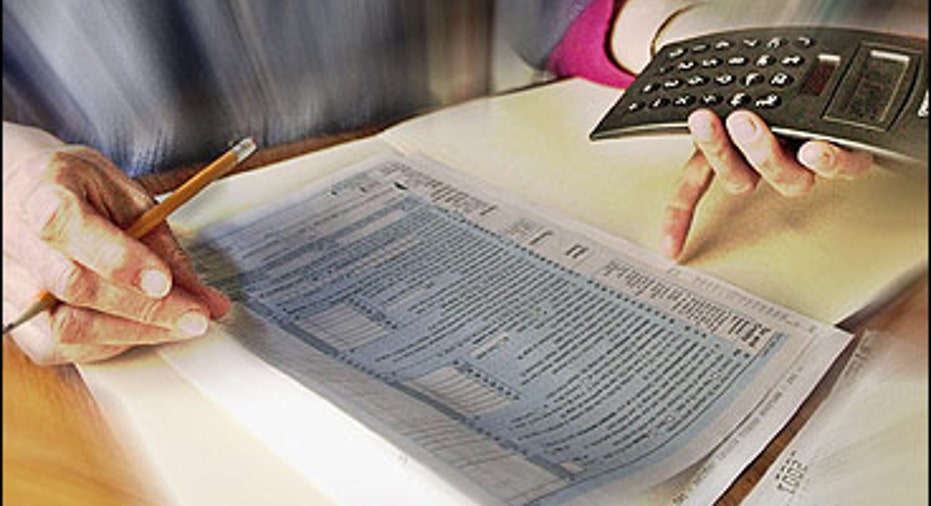Tips to Make Your Taxes Way Easier Next Year

The secret to tax success is apparently a multi-pocket file folder.
I know you'd probably like nothing more than to forget about taxes for the next several months. Some of you will certainly go about 50 weeks before you get going on another tax return, but your life will likely be much less hectic next April if you take a minute to think about what you might learn from your most recent tax year. I'm here to tell you that early 2015 does not need to be riddled with tax stresses
If the idea of reduced stress hasn't intrigued you, perhaps this will: Planning ahead for your taxes often results in financial savings. (Money! Hooray for money!) Now let's get back to that nifty folder I mentioned earlier. You may have guessed its purpose already — it's an organizational tool. If you're not an organized person, chances are you really despise tax time.
Unfortunately, there's not much you can do about this, other than force yourself to be more organized or accept the fact that you probably won't achieve your maximum savings or refund. Assuming the former option sounds more appealing, here's what you do.
1. Get Your Folder I talked to financial blogger "Joe Taxpayer" and tax analyst Mark Luscombe about ways to prepare for next tax season, and they both started with the folder approach.
You'll use these folders to save and separate the documents you'll need to do your tax return, so you'll probably want at least five pockets. The good news is there are about a gazillion folder options out there, so you can organize this however you want — whatever makes you stick to the system is a winning strategy.
2. Review Your Tax Return "What? I have to look at that thing again? Why are you ruining my lovely spring day with your gloomy tax business?" I'm sorry, I mean no harm, but it's best to do this when the tax-filing process is fresh in your mind.
Perhaps you had a moment this year when you were faced with the option of claiming a deduction, and you thought, "Hmmm, do I have everything I need to do this?" Perhaps you felt a sense of dread, thinking of those envelopes of unorganized receipts sitting on your desk, or worse, the documents you should have kept but threw in the recycling bin. Make a note of those things, and file everything you need in your handy-dandy folder as you collect them throughout the year.
"Fortunately, it only takes a bit of organization throughout the year, and filing your return will be as easy as flipping through documents in a folder and copying numbers over," said Joe Taxpayer, who blogs for TurboTax and H&R Block. For example: "Look at your current tax return," Joe Taxpayer said. "Did you itemize, and claim medical deductions? One pocket gets labeled ‘medical.’ During the year, every receipt for doctor co-pays, prescription medicine, eyeglasses, etc., all go there." F
ollow that pattern for charitable donations, home improvement costs, rental property expenses and self-employment expenses. Your 2013 return will help you decide what documents you need to save for next year, and if you make any financial changes in the new tax year, like buying a home, explore any tax benefits it carries and adjust your organization system accordingly. Luscombe, principal federal tax analyst for Wolters Kluwer, CCH, said people often scramble to get documentation in order to claim the child and dependent care credit.
"You have to provide the Social Security number or tax identification number of all the daycare providers," he said. Another one that's overlooked is the education tax credit, he said. It can be daunting to get to tax season, knowing you had qualified expenses you could claim if only you could find the receipts. The last section of your folder should be for tax-specific forms you receive at the start of the year: W-2s, 1099s (hope there isn't a 1099-c) and so on.
3. Re-Evaluate There's more to tax preparation than planning ahead for deductions.
Luscombe said you should look at the end result of your tax return and see if it signals a need for change. Did you receive a massive refund? It may be fun to get that lump sum of money, but you should consider adjusting your withholding for next year. If you paid an estimated tax penalty (this applies primarily to the self-employed), revisit your estimated tax calculation for next year. Here are a few additional questions Luscombe suggested asking yourself:
- Did you maximize your 401(k) or other retirement fund contributions?
- Were your itemized deductions reduced because of your income level?
- How did your investments impact your tax bill?
It's worth giving your tax return a second look in order to make things better next year. And hey, you'll have to do this for a long time, so you might as well figure out how to get good at it, right? Now, go get that folder.
Read More from Credit.com
How to File Your Taxes for Free



















